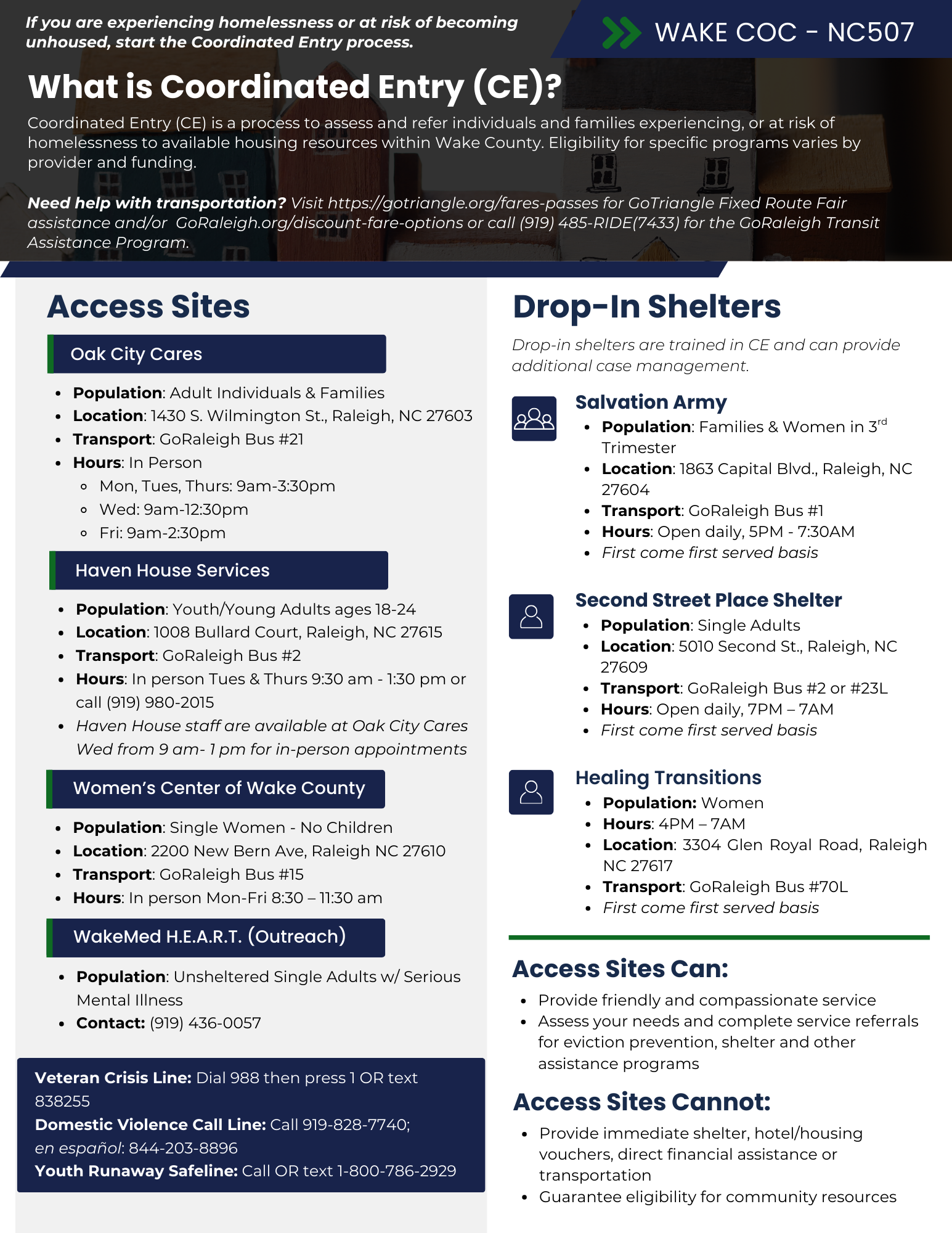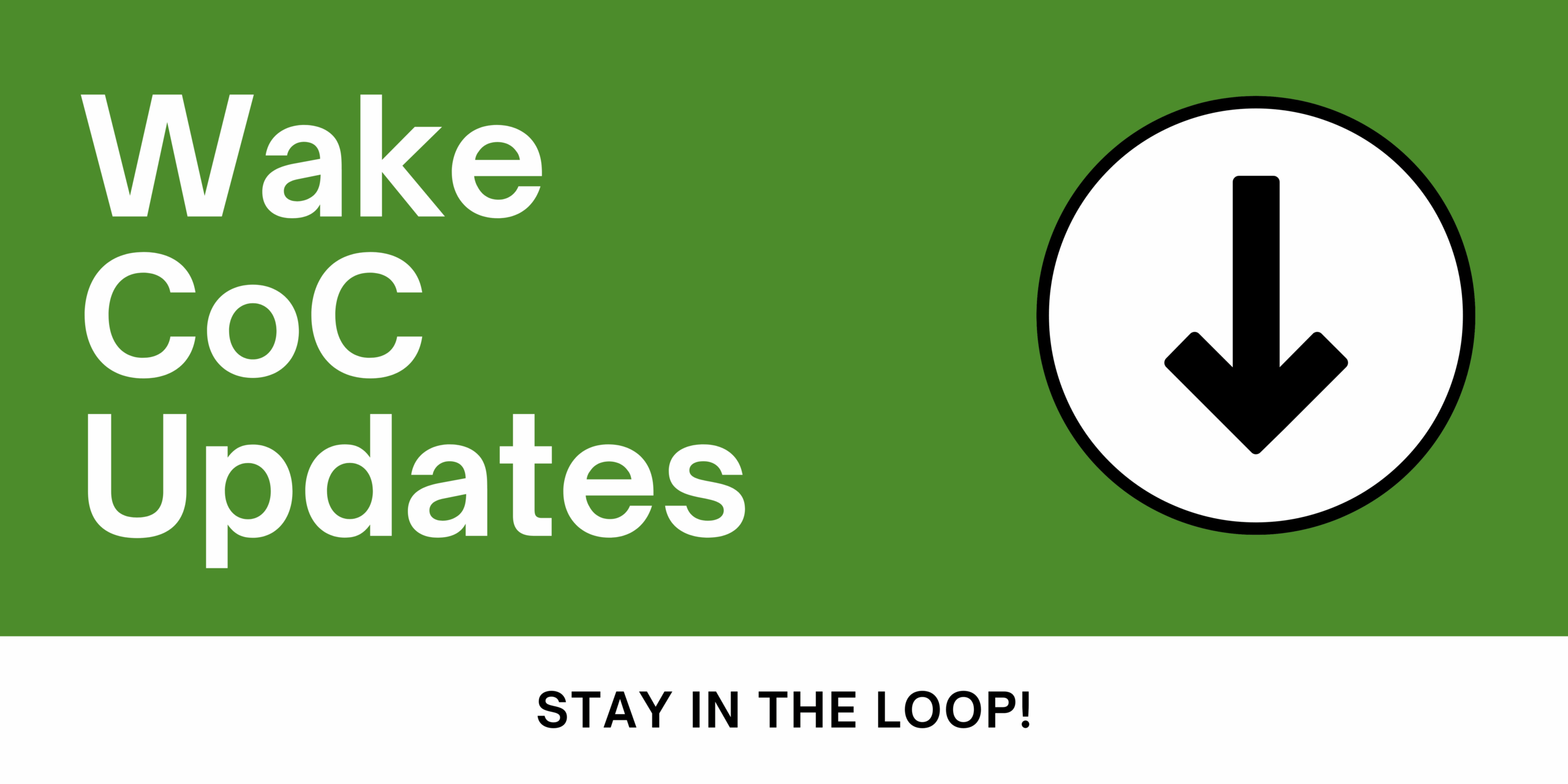Continuum of Care
White Flag 2025-2026
White Flag provides temporary emergency shelter to people experiencing homelessness during severe weather. In the winter, White Flag is declared on nights the temperature or windchill is expected to be below 35 degrees.

Coordinated Entry Flyer
Last Updated: September 11, 2025
Coordinated Entry is a process to assess and refer individuals and families experiencing, or at risk of homelessness to available temporary and permanent housing resources within Wake County. Eligibility for specific programs varies by provider and funding.
Download the Coordinated Entry flyer below for more information on access sites and drop-in shelters.
Please distribute widely.

Need More Resources?
GoWake SmartRide:
GoWake SmartRide NE is an on-demand public transit service that allows riders to schedule same-day trips within the northeastern region of Wake County through a mobile app or phone call. Those in Northeast Wake County can use SmartRide NE to travel to any location within the designated area. The service is available in the towns of Zebulon, Knightdale, and Wendell. You can find more info about the program at wake.gov/smartride. Riders can use the website’s GIS tool to confirm if their pickup and drop off locations are in the service zone. The service is fare free and open to all members of the general public. Please be advised that due to demand, SmartRide will be limiting rides in the month of May. Please contact the call center (919-212-7005) for more details.
GoWake SmartRide NE
GoWake Access:
The GoWake Access program provides door-to-door, shared ride transportation services to those in the general public who:
- Are age 60 or older
- Have a disability
- Need work-related transportation
- Reside in rural service zones of Wake County
- Participate in a sponsored eligible service (Medicaid, Public Health, Work First)
GoWake Access operates in all of Wake County. The service is free for Medicaid recipients. Other riders may qualify for free rides and should contact the call center (919-212-7005) for more eligibility info. Members of the general public who do not fall into the above categories pay $2-$4 based on the pickup and drop off locations. Riders are encouraged to book a minimum of 24-hours in advance. General public rides are available on a first come, first served basis. You can find more info at wake.gov/gowake.
GoWake Access
Food Bank of Central and Eastern North Carolina Food Finder:
If you are in need of food, please use the search engine linked below to find an agency near you. Please note that partner agency days and hours of operation are subject to change and may vary from what appears in the search results. It is recommended to contact an agency before you visit to confirm its hours and days of operation and the availability of food on that day.
Food Bank of Central and Eastern North Carolina Food Finder
Wake County Food and Nutrition Services:
The Food and Nutrition Services (FNS) Program, previously referred to as Food Stamps, helps low-income households with monthly food expenses. The purpose of Food and Nutrition Services is to end hunger and improve nutrition and health. It helps eligible households buy the food they need for a nutritionally adequate diet. Apply by clicking the link below.
Wake County Food and Nutrition Services
Utility Bill Assistance – Help for Heating, Cooling and Water:
Extreme heat or cold during the winter and summer months can cause energy costs to increase and result in high energy bills that can impact a family’s budget. Water bills can also cause unexpected expenses on family finances. There are some Wake County programs that may be able to offer help for these expenses. See available programs by clicking the link below.
Utility Bill Assistance – Help for Heating, Cooling and Water
Cool For Wake:
Cool for Wake is a seasonal weather relief program that provides free fans to vulnerable residents who are adversely affected by extreme summer temperatures between May and September
Households eligible for assistance from the Cool for Wake project include homes where a child, senior or disabled person is living without air conditioning. See more information by clicking the link below.
Cool For Wake
NCWorks:
Contact NCWorks Career Center, located at 1830 Tillery Pl # B, Raleigh, NC 27604, by filling out the contact form linked below to have someone reach out to you on how to get career assistance.
NCWorks Career Center Contact Form
OR visit the NCWorks online Job Seeker Services search, linked below.
NCWorks Online Job Seekers Search
Wake Network of Care
The Wake Network of Care is a comprehensive, up to date Service Directory to locate needed services, organizations, and supports throughout Wake County.
Wake Network of Care